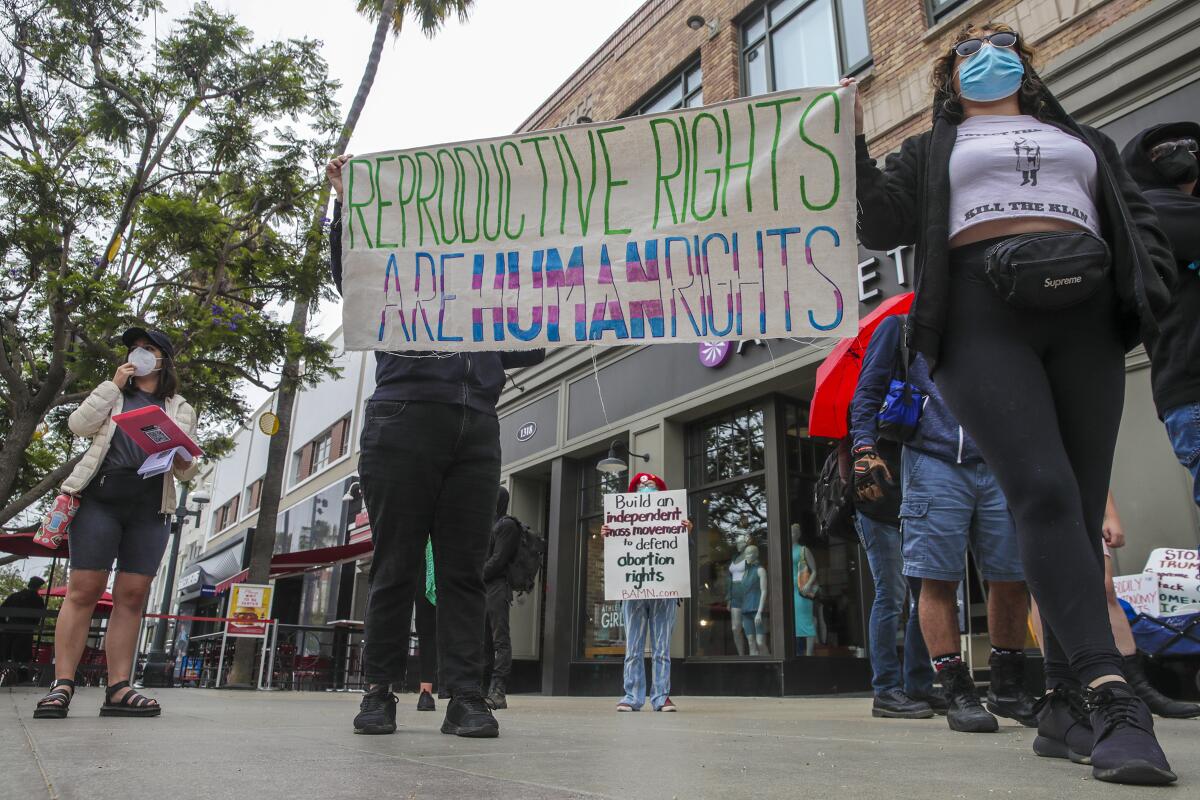Corporations supporting abortion rights? Their political donations tell a different story

- Share via
Just a few months ago, it would have been unusual for baristas to ask their boss for travel funds to get an out-of-state abortion. But after last month’s Supreme Court ruling overturning Roe vs. Wade, and with abortion being banned or severely restricted in more than half the states, that might be the new reality for millions of Americans.
After a draft of the June ruling was leaked in May, Starbucks and other companies announced that they would reimburse travel expenses for employees seeking legal abortions outside their state. Since the court’s ruling in June, dozens more have joined the chorus to aid their abortion-seeking workers, including Meta, Yelp, Tesla, Target, Nordstrom and Dick’s Sporting Goods.
This is a generous gesture by entities rarely involved in the business of reproductive healthcare. But it’s hard to trust their sincerity when you look at where these companies’ money is going.
Many of the corporations offering abortion funds have contributed hundreds of thousands of dollars to Republicans working to limit abortion access. According to a report by the Center for Political Accountability, Bank of America gave $25,000 last year to the Republican Attorneys General Assn., whose members support restricting abortion access. Other corporations that pledged to assist employee travel for abortions also donated to the Republican group in recent years, including Yelp, Citigroup, Microsoft, Uber and Bank of America.
Many of these companies contributed equal or larger amounts to Democrats (which is itself problematic due to the outsized influence of money in politics), but given the companies’ commitment to help employees bypass abortion restrictions, their contributions to GOP leaders who have enacted those restrictions are especially hypocritical.
Abortion advocates have filed lawsuits in a dozen states to block abortion bans. It may be an uphill battle, but it’s worth fighting.
Would you expect Johnson & Johnson, a company that touts “expanding access to healthcare” and prioritizing the “world’s most underserved,” to be among them? The company gave $175,000 last year to Republican groups, including $50,000 to the Republican Attorneys General Assn.
The attorney group hosted a private retreat this week for corporations whose potential donations would “combat the Democrats’ pro-abortion agenda and stand tall for life,” according to a June 24 fundraising email. Johnson & Johnson, Match Group and Comcast were on the list of expected attendees, despite their statements that they would pay for employees to travel to obtain an abortion.
Funding such efforts hardly rings of benevolent employers supporting their workers’ reproductive needs.
“If you saw a firm really supporting the rights of its workers, it would be saying, ‘our company is no longer giving campaign contributions to any politician who is implementing any of these policies, or has said that they will.’ That would be a move in favor of worker solidarity,” Barnard College professor of women and economics Elizabeth Ananat told me.
Why would companies that outwardly support abortion rights give money to political causes they ostensibly oppose? The answer is, unsurprisingly, rooted in their fundamental desire for profit.
Most large corporations want access to politicians, so they spread their contributions across political parties and people with “very different” ideological approaches, according to John Schmitt, a senior economist at the Economic Policy Institute.
“They’re not using their time sitting with legislators to change their minds about abortion,” Schmitt told me. “They’re using the time to change the regulatory structure that affects their industries or to influence where federal, state [or] local funds go.”
It’s only natural that a company will pursue its bottom line, but at what human cost? How many women would need to be forced into motherhood for a CEO to cut ties with antiabortion politicians and groups? One would think such a decision is swift, but in the bizarre moral universe of corporate business, it must be weighed carefully against potential financial risks a company could face.
“The fact is, it can’t be a bloodless business decision because of the broader dimension of risks that companies face today,” Bruce Freed, president of the Center for Political Accountability, told me.
These corporations have already racked up a laundry list of sins. Amazon, which gave $200,000 to the Republican Governors Assn. this year, is notorious for its dehumanizing and unsafe worker conditions, with workers reporting urinating in water bottles. Starbucks, which donated over $4,000 this year to Republican national committees and over $40,000 to such groups in 2020, was charged with more than 200 labor violations in New York after allegedly coercing employees out of forming unions and employing intimidation tactics against baristas. With such records, why should anyone see pledges of corporate goodness as anything but image control?
Corporations stepping up for their distressed, abortion-seeking employees might tell a heartfelt story. But if we want a tale of true virtue, companies’ words need to match their actions.
More to Read
A cure for the common opinion
Get thought-provoking perspectives with our weekly newsletter.
You may occasionally receive promotional content from the Los Angeles Times.











